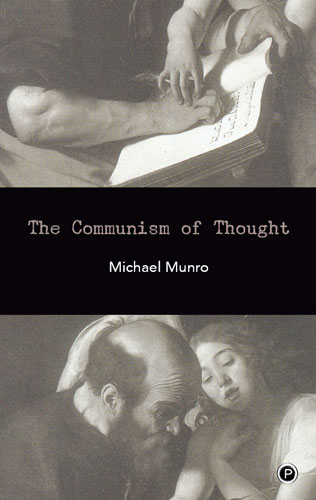Michael Munro’s “The Communism of Thought” is difficult to categorize.
At the heart of the book, which was published earlier this year by Brooklyn’s Punctum Books, is a commentary on letters written in 1988 between two French philosophers, Dionys Mascolo and the more famous (or infamous) Gilles Deleuze. Commentary, a vine that grows around and hangs from the branches of a text, can choke its host or flourish in symbiotic harmony, but whether it enhances or obscures, it offers readers handholds for climbing.
In Nabokov’s novel “Pale Fire,” a story is told largely via a fictional academic’s humorously self-absorbed commentary on a colleague’s poem. Munro, by contrast, is determined not to fool us nor himself — he lays bare his misgivings. Consequently, this is a book that, as you try to read it, seems preoccupied with trying to read itself. It aggressively investigates its own terms in the manner of someone tearing apart an apartment looking for lost keys. Lines of inquiry auto-deconstruct, bridges crumbling as the author crosses them. Readers may get winded trying to keep up.
It is your humble reviewer’s best guess that this book is, in part, an affectionate attempt to return the favor — to give Deleuze’s letters the sort of treatment Deleuze himself might have given someone else’s. Munro turns the philosophers’ letters into intellectual origami — not by means of deformation or violence, but simply by opening them out, flower-like, into fresh configurations. As in Deleuze, there is a tendency to mix theoretical subjects with geometry. Relations between ideas or approaches are often described as if the concepts were different areas of a map or discrete objects in three-dimensional space. Sometimes this analytical framework proves illuminating, but it can also more deeply veil already murky subjects.
Readers who attack this book with a stern determination to “understand it” will find it a hostile hall of mirrors, their own frown reflected unhelpfully in every facet of the book’s dizzying interior structure. The third section is particularly baffling. Those who can keep a sense of humor amidst bewilderment will find themselves in an M.C. Escher waterpark, carried along by the current or skipping like a stone across its surfaces.
What is a friendship? And how could or would such a phenomenon exist between correspondents? Munro isn’t afraid to make assertions, and he does eventually lay out a convincing formula for the specific dynamic of the friendship between Mascolo and Deleuze. Then, with barely a pause to let us wring the brain-sweat from our kerchiefs, Munro would like to know — what is a question?
The brief section that follows, filling the book’s final pages, might at first seem unrelated to what came before, but it is our author gamely recalibrating his apparatus of inquiry — the telescope is pushed back through its own cylinder, beneath which Munro calls himself to account for what he had hoped to accomplish with the book’s central undertaking. He quotes, perhaps tellingly, from a work titled “Kafka Defended Against His Interpreters,” offering us a fable in which explanations are a means to both demonstrate and seal a matter’s inexplicability.
Munro may feel himself in a cosmos unmoored from meaning, in which no action is more than gestural, but it is with gesture that an orchestra conductor summons universes of sound. Its terminology can be challenging, but “The Communism of Thought” is an enjoyable read, rooted as it is in sweetness. It is an effort to share with us the author’s complex but heartfelt enthusiasm.
“February Houses,” named after the 20th-century Brooklyn arts commune, spotlights recent or noteworthy literature from Brooklyn publishers. To send books for review, contact xjulesbentleyx@gmail.com.
























